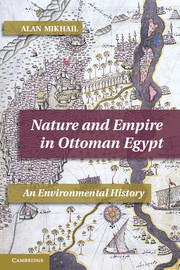Book contents
- Frontmatter
- Contents
- Maps
- Figures
- Tables
- Note on Transliteration and Dates
- Abbreviations
- Acknowledgments
- Map 1 Egypt and the Ottoman Empire
- Map 2 Lower Egypt (Nile Delta)
- Map 3 Middle Egypt
- Map 4 Upper Egypt
- Map 5 Cairo and Surroundings, 1801
- Introduction: Empire by Nature
- 1 Watering the Earth
- 2 The Food Chain
- 3 The Framework of Empire
- 4 In Working Order
- 5 From Nature to Disease
- 6 Another Nile
- Conclusion: The Imagination and Reality of Public Works
- Appendix: Citations for Cases Included in Tables 2.1–2.4
- Bibliography
- Index
- Titles in the series
Introduction: Empire by Nature
Published online by Cambridge University Press: 03 May 2011
- Frontmatter
- Contents
- Maps
- Figures
- Tables
- Note on Transliteration and Dates
- Abbreviations
- Acknowledgments
- Map 1 Egypt and the Ottoman Empire
- Map 2 Lower Egypt (Nile Delta)
- Map 3 Middle Egypt
- Map 4 Upper Egypt
- Map 5 Cairo and Surroundings, 1801
- Introduction: Empire by Nature
- 1 Watering the Earth
- 2 The Food Chain
- 3 The Framework of Empire
- 4 In Working Order
- 5 From Nature to Disease
- 6 Another Nile
- Conclusion: The Imagination and Reality of Public Works
- Appendix: Citations for Cases Included in Tables 2.1–2.4
- Bibliography
- Index
- Titles in the series
Summary
Water lends itself to cliché – its beauty, its power, its abundance or absence, its transformative capabilities. Long before and after Herodotus observed Egypt to be “the gift of the Nile,” others have offered clichés about the role of the Nile's waters in Egypt's history. This book avoids those and other clichés altogether in favor of a social and environmental history of water usage and irrigation in the Egyptian countryside in the long eighteenth century (1675 to 1820). Water, however, is only one part of this environmental story of Egypt. Timber, plague, animals, wind, grain, and microbes all have their roles to play as well in this account of struggle and community, of want and excess, of import and export, and ultimately of literal life and death.
In the chapters that follow, I first detail an Ottoman imperial system of natural resource allocation and balance that served to move grains – the products of irrigation – out of Egypt and wood supplies – vital material needed for Egypt's rural irrigation infrastructure – into this most lucrative of the Empire's provinces. Water bound Egyptian peasants in even the most rural locations to the center of the Empire in Istanbul because the status of a dam or canal in Egypt held wide imperial consequences. The disrepair of irrigation works and the destruction of agricultural land that would surely ensue meant less food and less money for this early modern land-based, agrarian polity.
- Type
- Chapter
- Information
- Nature and Empire in Ottoman EgyptAn Environmental History, pp. 1 - 37Publisher: Cambridge University PressPrint publication year: 2011



